Maned wolf
The maned wolf (Chrysocyon brachyurus) is the largest canid of South America.[4] Its markings resemble those of foxes, but it is neither a fox nor a wolf. It is the only species in the genus Chrysocyon (meaning "golden dog").
| Maned wolf[1] | |
|---|---|
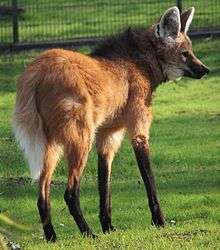 | |
| Maned wolf in Cologne Zoo, Germany | |
| Scientific classification | |
| Kingdom: | Animalia |
| Phylum: | Chordata |
| Class: | Mammalia |
| Order: | Carnivora |
| Family: | Canidae |
| Subfamily: | Caninae |
| Tribe: | Canini |
| Genus: | Chrysocyon Smith, 1839 |
| Species: | C. brachyurus |
| Binomial name | |
| Chrysocyon brachyurus (Illiger, 1815) | |
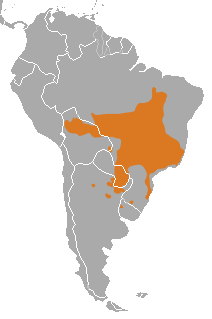 | |
| Range of the maned wolf | |
| Synonyms[3] | |
|
Canis brachyurus, C. campestris, C. isodactylus, C. jubatus, Vulpes cancrosa | |
It is the largest canid in South America, with a weight between 20 and 30 kg, and reaches up to 90 cm at the withers. Its long, thin legs and dense reddish coat give it an unmistakable appearance. The maned wolf is a crepuscular and omnivorous animal adapted to the open environments of the South American savanna, with an important role in the seed dispersal of fruits, especially the wolf apple (Solanum lycocarpum). The maned wolf is a solitary animal. It communicates primarily by scent marking, but also gives a loud call known as "roar-barking".
This mammal is found in open and semi open habitats, especially grasslands with scattered bushes and trees, in the Cerrado of south, central-west, and southeastern Brazil; Paraguay; northern Argentina; and Bolivia east and north of the Andes,[5] and far southeastern Peru (Pampas del Heath only).[6] It is very rare in Uruguay, possibly being displaced completely through loss of habitat.[2] The International Union for Conservation of Nature lists it as near threatened,[2] while it is considered a vulnerable species by the Brazilian Institute of Environment and Renewable Natural Resources.
Etymology
The term Maned wolf, as the Crin Wolf in Spanish, is an allusion to the mane of the nape. It is known locally as aguará guazú (meaning "large fox" in the Guarani language), or kalak in the Toba Qom language, lobo de crin, lobo de los esteros, or lobo colorado, and lobo-guará in Brazil. The term lobo, "wolf", originates from the Latin lupus. Guará and aguará originated from tupi-guarani agoa'rá, "by the fuzz". It also is called borochi in Bolivia.[7]
Taxonomy
Although the maned wolf displays many fox-like characteristics, it is not closely related to foxes. It lacks the elliptical pupils found distinctively in foxes. The maned wolf's evolutionary relationship to the other members of the canid family makes it a unique animal.
Electrophoretic studies did not link Chrysocyon with any of the other living canids studied. One conclusion of this study is that the maned wolf is the only species among the large South American canids that survived the late Pleistocene extinction. Fossils of the maned wolf from the Holocene and the late Pleistocene have been excavated from the Brazilian Highlands.[8]
A 2003 study on the brain anatomy of several canids placed the maned wolf together with the Falkland Islands wolf and with pseudo-foxes of the genus Pseudalopex.[9] One study based on DNA evidence showed that the extinct genus Dusicyon, comprising the Falkland Islands wolf and its mainland relative, was the most closely related species to the maned wolf in historical times, and that about seven million years ago it shared a common ancestor with that genus.[10] A 2015 study reported genetic signatures in maned wolves that are indicative of population expansion followed by contraction that took place during Pleistocene interglaciations about 24,000 years before present.[11]
The maned wolf is not closely related to any other living canid. It is not a fox, wolf, coyote, dog, or jackal, but a distinct canid, though, based only on morphological similarities, it previously had been placed in the Canis and Vulpes genera.[3] Its closest living relative is the bush dog (genus Speothos), and it has a more distant relationship to other South American canines (the short-eared dog, the crab-eating fox, and the zorros or Lycalopex).[12]
| Cerdocyonina |
| |||||||||||||||||||||||||||||||||||||||||||||||||||||||||||||||
Description
The species was described in 1815 by Johann Karl Wilhelm Illiger, initially as Canis brachyurus. Lorenz Oken classified him as Vulpes cancosa, and only in 1839 did Charles Hamilton Smith describe the genus Chrysocyon. Other authors later considered him as a member of the Canis genus.[4] Fossils of Chrysocyon dated from the Late Pleistocene and Holocene epochs were collected in one of Peter Wilheim Lund expeditions to Lagoa Santa, Minas Gerais (Brazil). The specimen is kept in the South American Collection of the Zoologisk Museum, Denmark. Since there is no other record of fossils in other areas, is suggested that the species evolved in this geographic region.[4]
The maned wolf bears minor similarities to the red fox, although it belongs to a different genus. The average adult weighs 23 kg (51 lb) and stands 90 cm (35 in) tall at the shoulder, has a head-body length of 100 cm (39 in) with the tail adding another 45 cm (18 in).[13] Its ears are large and long (7 inches).[14]
The maned wolf is the tallest of the wild canids; its long legs are likely an adaptation to the tall grasslands of its native habitat.[15] Fur of the maned wolf may be reddish-brown to golden orange on the sides with long, black legs, and a distinctive black mane. The coat is marked further with a whitish tuft at the tip of the tail and a white "bib" beneath the throat. The mane is erectile and typically is used to enlarge the wolf's profile when threatened or when displaying aggression. Melanistic maned wolves do exist, but are rare. The first photograph of a black adult maned wolf was taken by a camera trap in northern Minas Gerais in Brazil in 2013.[16][17][18]
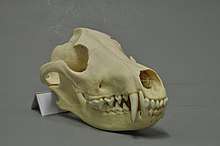
The skull can be identified by its reduced carnassials, small upper incisors and long canine teeth.[13] Like other canids, it has 42 teeth with the dental formula 3.1.4.23.1.4.3 × 2 = 42. The maned wolf's rhinarium extends to the upper lip, similar to the bush dog, but its vibrissae are longer.[13] The skull also features a prominent sagittal crest.
The maned wolf's footprints are similar to those of the dog, but have disproportionately small plantar pads when compared to the well-opened digit marks.[19][20] The dog has pads up to 3 times larger than the maned wolf's footprint.[21] These pillows have a triangular shape.[21] The front footprints are 7 to 9 cm long and 5.5 to 7 cm wide, and those of the hind feet are 6.5 to 9 cm long and 6.5 to 8.5 cm wide.[21] One feature that differentiates the maned wolf's footprint from that of other South American canids is the proximal union of the third and fourth digits.[13]
Genetics
Genetically, the maned wolf has 37 pairs of autosomes within diploid genes, with a karyotype similar to that of other canids. It has 76 chromosomes, and therefore cannot interbreed with other canids.[13] Evidence suggests that 15,000 years ago, the species suffered a reduction in its genetic diversity, called the bottleneck effect. However, its diversity is still greater than that of other canids.[22]
The maned wolf also is known for the distinctive odor of its territory markings, which has earned it the nickname "skunk wolf".
Ecology and behavior
Hunting and territoriality
The maned wolf is a twilight animal, but its activity pattern is more related to the relative humidity and temperature, similar to that observed with the bush dog (Speothos venaticus). Peak activity occurs between 8am and 10am in the morning and 8pm and 10pm in the night time.[23] On cold or cloudy days they can be active all day. The species is likely to use open fields for foraging and more closed areas, such as riparian forests, to rest, especially on warmer days.[13]
Unlike most large canid species (such as the gray wolf, the African hunting dog, or the dhole), the maned wolf is a solitary animal and does not form packs.[13] It typically hunts alone, usually between sundown and midnight, rotating its large ears to listen for prey animals in the grass. They tap the ground with a front foot to flush out the prey and pounce to catch it.[14] They kill prey by biting on the neck or back, and shaking the prey violently if necessary.[24] Monogamous pairs may defend a shared territory around 30 km2 (12 sq mi), although outside of mating, the individuals may meet only rarely. The territory is crisscrossed by paths that they create as they patrol at night. Several adults may congregate in the presence of a plentiful food source, for example, a fire-cleared patch of grassland that would leave small vertebrate prey exposed while foraging.
Both female and male maned wolves use their urine to communicate,[25] e.g. to mark their hunting paths or the places where they have buried hunted prey.[24] The urine has a very distinctive odor, which some people liken to hops or cannabis. The responsible substance very likely is a pyrazine, which also occurs in both plants.[26] (At the Rotterdam Zoo, this smell once set the police on a hunt for cannabis smokers.[26][27]) The preferred habitat of the maned wolf includes grasslands, scrub prairies, and forests.
Reproduction and life cycle
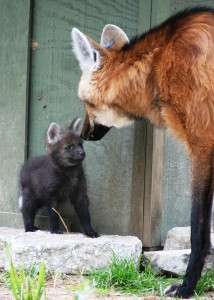
Their mating season ranges from November to April. Gestation lasts 60 to 65 days and a litter may have from two to six black-furred pups, each weighing roughly 450 g (16 oz). Pups are fully grown when one year old. During that first year, the pups rely on their parents for food.[24]
Data on the maned wolf's estrus and reproductive cycle mainly comes from captive animals, particularly about breeding endocrinology.[28] However, studies have found that hormonal changes of maned wolves in the wild follow the same variation pattern of those in captivity.[28] Females ovulate spontaneously, but some authors suggest that the presence of a male is important for estrus induction.[28]
Captive animals in the Northern Hemisphere breed between October and February and in the Southern Hemisphere between August and October. This indicates that photoperiod plays an important role in maned wolf reproduction, mainly due to the production of semen.[13][28] Generally, one estrus occurs per year.[13] The amount of sperm produced by the maned wolf is lower compared to that of other canids.[28]
Copulation occurs during the 4-day estrus period and is followed by up to 15 minutes of sexual intercourse.[13] Courtship is similar to that of other canids, characterized by frequent approaches and anogenital investigation.[6]
Gestation lasts 60 to 65 days and a litter may have from two to six pups. One litter of seven has been recorded.[13] Birthing has been observed in May in the Canastra Mountains, but data from captive animals suggest that births are concentrated between June and September.[22] The maned wolf reproduces with difficulty in the wild, with a high rate of infant mortality. Females can go up to two years without breeding.[28] Breeding in captivity is even more difficult, especially in temperate parts of the Northern Hemisphere.[28]
Pups are born weighing between 340 and 430 grams. They begin their lives with black fur, becoming red after ten weeks.[13] The eyes open at about 9 days of age.[13] They are breastfed up to 4 months. Afterwards, they are fed by their parents via regurgitation, starting on the 3rd week of age and lasting up to 10 months.[29][6] Three-month-old pups begin to accompany their mother while she forages.[29] Males and females both engage in parental care, but it is primarily done by the females.[29] Data on male parental care has been collected from captive animals and little is known whether this occurs frequently the wild.[6] Maned wolves reach sexual maturity at 1 year of age, when they leave their birth territory.[6]
The maned wolf's longevity in the wild is unknown, but estimates in captivity are between 12 and 15 years.[13] There is a report of an individual at the São Paulo Zoo who lived to be 22 years old.[22]
Diet
.jpg)
The maned wolf is omnivorous. It specialises in preying on small and medium-sized animals, including small mammals (typically rodents and rabbits), birds, and even fish,[30][24] but a large portion of its diet (more than 50%, according to some studies) is vegetable matter, including sugarcane, tubers, and fruit.[31] Up to 301 food items have been recorded in the maned wolf's diet, including 116 plants and 178 animal species.[28]
The maned wolf hunts by chasing its prey, digging holes, and jumping to catch birds in flight. About 21% of hunts are successful.[6] Some authors have recorded active pursuits of the Pampas deer.[29] They were also observed feeding on carcasses of run down animals.[6] Fecal analysis has shown consumption of the giant anteater, bush dog, and collared peccary, but it is not known whether these animals are actively hunted or scavenged.[22][29] Armadillos are also commonly consumed.[28] Animals are more often consumed in the dry season.[13][31]
The wolf apple (Solanum lycocarpum), a tomato-like fruit, is the maned wolf's most common food item. With some exceptions, these fruits make up between 40 and 90% of the maned wolf's diet.[13][29][31][32] The wolf apple is actively sought by the maned wolf, and is consumed throughout the year, unlike other fruits that can only be eaten in abundance during the rainy season.[29][31] It can consume several fruits at a time and disperse intact seeds by defecating, making it an excellent disperser of the wolf apple plant.[29]
Despite their preferred habitat, maned wolves are ecologically flexible and can survive in disturbed habitats, from burned areas to places with high human influences. Burned areas have some small mammals, such as hairy-tailed bolo mouse (Necromys lasiurus) and vesper mouse (Calomys spp.) that they can hunt and survive on.[33]
Historically, captive maned wolves were fed meat-heavy diets, but that caused them to develop bladder stones. Zoo diets for them now feature fruits and vegetables, as well as meat and specialized extruded diet formulated for maned wolves to be low in stone-causing compounds (i.e. cystine).
Relations with other species
The maned wolf participates in symbiotic relationships. It contributes to the propagation and dissemination of the plants on which it feeds, through excretion. Often, maned wolves defecate on the nests of leafcutter ants. The ants then use the dung to fertilize their fungus gardens, but they discard the seeds contained in the dung onto refuse piles just outside their nests. This process significantly increases the germination rate of the seeds.
They are parasitized by ticks, mainly of the genus Amblyomma, and by flies such as Cochliomyia hominivorax, usually on the ears.[34] Interestingly, the maned wolf is poorly parasitized by fleas. The sharing of territory with domestic dogs results in a number of diseases, such as rabies virus, parvovirus, distemper virus, canine adenovirus, protozoan Toxoplasma gondii, bacterium Leptospira interrogans, and nematode Dirofilaria immitis.[35][34] The maned wolf is particularly susceptible to potentially fatal infection by the giant kidney worm. It has been suggested that ingestion of the wolf apple could prevent maned wolves from contracting this nematode, but such a hypothesis has been questioned by several authors.[36]
Its predators are mainly large cats, such as the puma (Puma concolor) and the jaguar (Panthera onca), but it is most often preyed upon by the jaguar.[37]
Relations with humans
Generally, the maned wolf is shy and flees when alarmed, so it poses little direct threat to humans. Popularly, the maned wolf is thought to have the potential of being a chicken thief. It once was considered a similar threat to cattle and sheep, although this now is known to be false.
Historically, in a few parts of Brazil, these animals were hunted for some body parts, notably the eyes, that were believed to be good-luck charms. Since its classification as a vulnerable species by the Brazilian government, it has received greater consideration and protection.
They are threatened by habitat loss and being run over by automobiles. Feral and domestic dogs pass on diseases to them, and have been known to attack them.
The species occurs in several protected areas, including the national parks of Caraça and Emas in Brazil. The maned wolf is well represented in captivity and has been bred successfully at many zoos,[38] particularly in Argentina, North America (part of a Species Survival Plan) and Europe (part of a European Endangered Species Programme). In 2012, a total of 3,288 maned wolves were kept at more than 300 institutions worldwide.[39] The Smithsonian National Zoo Park has been working to protect maned wolves for nearly 30 years, and coordinates the collaborative, interzoo maned wolf Species Survival Plan of North America, which includes breeding maned wolves, studying them in the wild, protecting their habitat, and educating people about them.[14]
Conservation
The maned wolf is not considered an endangered species by the IUCN because of its wide geographical distribution and adaptability to man-made environments. But their populations have been declining and the species may be in some threat category soon, so the IUCN classifies it as a near-threatened species.[22] Until 1996 the maned wolf was a vulnerable species by the IUCN. It is also listed in CITES Appendix II, which does not characterize it as threatened but notes that if there are no conservation measures, the species may fall into some category of threat in the future.[22] The ICMBio list in Brazil that follows the same IUCN criteria considers the wolf to be a vulnerable species.[40][41] By these same criteria, the Brazilian state lists also consider it more problematic: it is a vulnerable species in the lists of São Paulo and Minas Gerais, while in the lists of Paraná, Santa Catarina and Rio Grande do Sul the maned wolf is considered as "endangered" and "critically endangered" respectively.[41][42] In Uruguay, although there is no such list as Brazil and IUCN, it is regarded as a species with "priority" for conservation. In Argentina it is not considered to be in critical danger, but it is recognized that its populations are declining and are fragmented.[43] The situation of the maned wolf in Bolivia[44] and Paraguay[45] is uncertain. Even with these uncertainties the maned wolf is protected against hunting in all countries.[6]
In human cultures
Human attitudes and opinions about the maned wolf vary across populations, ranging from fear and tolerance to aversion. In some regions of Brazil, parts of the animal's body are believed to help cure bronchitis, kidney disease, and even snake bites. It is also believed that it can bring good luck.[6] These parts can be teeth, the heart, ears and even dry stools.[42] In Bolivia it is believed that mounting a saddle made of maned wolf leather protects from bad luck. Despite these superstitions, there is no large-scale use of parts of this animal.[6]
In urban societies in Brazil people tend to be sympathetic to the maned wolf, seeing no values in it as a hunting animal or pest. They often consider its preservation to be important, and although these societies associate it with force and ferocity, they do not consider it a dangerous animal.[42] Although popular in some places and common in many zoos, it can go unnoticed. Studies in zoos in Brazil showed that up to 30% of respondents were either unaware or unable to recognize a maned wolf.[6]
It was considered a common animal by the Guarani people and the first names used by Europeans, such as the Spanish jesuit missionary Joseph of Anchieta, were the same used by the native peoples (yaguaraçú).[28] The Spanish naturalist Felix de Azara also used the Guarani name to describe it. Azara was also one of the first to describe the biology of the species and consider it an important part of Paraguay's fauna.[42] Much of the negative view of the maned wolf as a poultry predator stems from European ethnocentrism, where peasants often had problems with wolves and foxes.[28]
The maned wolf rarely causes antipathy in the human populations of the places in which it lives. For this reason it has been used as a flag species for the preservation of the Brazilian cerrado.[28] It has also been represented on the 100 cruise coin, which circulated in Brazil between 1993 and 1994.[46]
Gallery
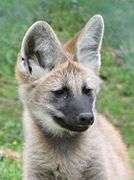 Maned wolf pup
Maned wolf pup
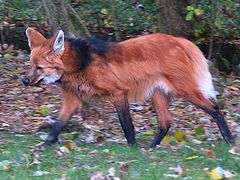
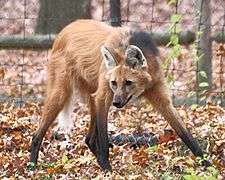
.jpg) Maned wolf heart
Maned wolf heart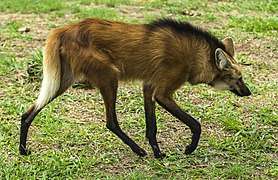
References
- Wozencraft, W.C. (2005). "Order Carnivora". In Wilson, D.E.; Reeder, D.M (eds.). Mammal Species of the World: A Taxonomic and Geographic Reference (3rd ed.). Johns Hopkins University Press. pp. 532–628. ISBN 978-0-8018-8221-0. OCLC 62265494.
- Rodden, M.; Rodrigues, F. & Bestelmeyer, S. (2008). "Chrysocyon brachyurus". IUCN Red List of Threatened Species. 2008. Retrieved 22 March 2009.CS1 maint: ref=harv (link) Database entry includes justification for why this species is near threatened.
- Osgood, Wilfred H. (1919). "Names of Some South American Mammals". Journal of Mammalogy. 1 (1): 33–36. doi:10.2307/1373718. JSTOR 1373718.
- Dietz, James M. (24 May 1985). "Chrysocyon brachyurus" (PDF). Mammalian Species. The American Society of Mammalogists (234): 1–4. doi:10.2307/3503796.
- Langguth, A. (1975). "Ecology and evolution in the South American canids". In Fox, M. W. (ed.). The wild canids: their systematics, behavioral ecology and evolution. New York: Van Nostrand Reinhold Company. pp. 192–206. ISBN 978-0442224301.
- Rodden, M.; Rodrigues, F.; Bestelmeyer, S. (2004). "Chapter 3. South America (Neotropical)" (PDF). In Sillero-Zubiri, C.; Hoffmann, M.; Macdonald, D.W. (eds.). Canids: Foxes, Wolves, Jackals and Dogs. Status Survey and Conservation Action Plan. Gland, Switzerland and Cambridge, UK: IUCN/SSC Canid Specialist Group. pp. 26–80. ISBN 2-8317-0786-2.
- Ferreira, A. B. H. (1986). Novo Dicionário da Língua Portuguesa 2ª ed. Rio de Janeiro: Nova Fronteira
- "Chrysocyon brachyurus - Maned wolf". Animal Diversity Web.
- Lyras, G. A.; Van der Geer, A. A. E. (2003). "External brain anatomy of the Canidae". Zoological Journal of the Linnean Society. 138 (4): 505–522. doi:10.1046/j.1096-3642.2003.00067.x.
- Austin, J. J.; Soubrier, J.; Prevosti, F. J.; Prates, L.; Trejo, V.; Mena, F.; Cooper, A. (2013). "The origins of the enigmatic Falkland Islands wolf". Nature Communications. 4: 1552. Bibcode:2013NatCo...4.1552A. doi:10.1038/ncomms2570. PMID 23462995.
- González, S.; Cosse, M.; del Rosario Franco, M.; Emmons, L.; Vynne, C.; Duarte, J. M. B.; Beccacesi, M. D.; Maldonado, J. E. (2015). "Population Structure of mtDNA Variation due to Pleistocene Fluctuations in the South American Maned Wolf (Chrysocyon brachyurus, Illiger, 1815): Management Units for Conservation". Journal of Heredity. 106 (S1): 459–468. doi:10.1093/jhered/esv043. PMID 26245781.
- Lindblad-Toh, Kerstin; Wade, Claire M.; Mikkelsen, Tarjei S.; Karlsson, Elinor K.; Jaffe, David B.; Kamal, Michael; et al. (2005). "Genome sequence, comparative analysis and haplotype structure of the domestic dog". Nature. 438 (7069): 803–819. Bibcode:2005Natur.438..803L. doi:10.1038/nature04338. PMID 16341006.
- Dietz, J. M. (1984). "Ecology and social organization of the maned wolf (Chrysocyon brachyurus)". Smithsonian Contributions to Zoology. 392 (392): 1–51. doi:10.5479/si.00810282.392.
- "Maned Wolf Facts". National Zoological Park. Archived from the original on 2015-10-31. Retrieved 2015-11-05.
- Dietz, James (1984). Macdonald, David W. (ed.). The Encyclopedia of Mammals. New York: Facts on File. p. 31. ISBN 978-0-87196-871-5.
- "WWF-Brazil partner photographs unique black maned wolf".
- "Black Maned Wolf is the People's Choice". World Land Trust. 2015-03-10.
- Ferreira GB, Barros CS, Costa AB, Dias TS, Oliveira MJR (2017). "First ever record of a black-coloured maned wolf" (PDF). Canid Biology & Conservation. 20 (10): 42–45. Archived from the original (PDF) on 2018-01-03. Retrieved 2018-12-24.
- Borges, P. L.; Tomás, W. M. (2004). Guia de rastros e outros vestígios de mamíferos do Pantanal. Corumbá: Embrapa Pantanal. p. 148. ISBN 85-98893-01-3.
- de Paula, R.C.; et al. (2013). "Avaliação do risco de extinção do lobo-guará Chrysocyon brachiurus (Illiger, 1815) no Brasil" [Maned wolf conservation status assessment Chrysocyon brachyurus (Illiger, 1815) in Brazil]. Biodiversidade Brasileira (in Portuguese). 3 (1): 146–159. ISSN 2236-2886.
- Berndt, Alexandre. Nutrição e ecologia nutricional de cervídeos brasileiros em cativeiro e no Parque Nacional das Emas - Goiás (Thesis). Universidade de Sao Paulo Sistema Integrado de Bibliotecas - SIBiUSP. doi:10.11606/t.91.2005.tde-09112005-144620.
- Frers, Cristian. "Un lobo de crin llamado Aguará Guazú". Retrieved 2007-04-23.
- Garcia, Agnaldo. "On the social behaviour of maned wolves (Chrysocyon brachyurus)." Boletim de Zoologia da Universidade de Sao Paulo 6 (1983): 63-77.
- Switek, Brian (2011-03-10). "Maned Wolf Pee Demystified". Wired. Retrieved 2011-06-05.
- Süddeutsche Zeitung, 2006-09-02, p3
- Consorte-McCrea, A. G.; Santos, E. F., eds. (2013). Ecology and conservation of the maned wolf : multidisciplinary perspectives. Boca Raton: CRC Press. ISBN 978-1-4665-1259-7. OCLC 861926329.
- Rodrigues, F (2002). Biologia e conservação do lobo-guará na Estação Ecológica de Águas Emendadas, DF (PDF) (Doctorate) (in Portuguese). University of Campinas.
- Juarez, Keila Macfadem; Marinho-Filho, Jader (November 2002). <0925:DHUAHR>2.0.CO;2 "Diet, habitat use, and home ranges of sympatric canids in central Brazil". Journal of Mammalogy. 83 (4): 925–934. doi:10.1644/1545-1542(2002)083<0925:DHUAHR>2.0.CO;2.
- Motta-Junior JC, Talamon SA, Lombardi JA, Simokomaki K (1996). "Diet of maned wolf, Chrysocyon brachyurus, in central Brazil". Journal of Zoology. 240 (2): 277–284. doi:10.1111/j.1469-7998.1996.tb05284.x.
- Amboni, M.P. (2007). Dieta, disponibilidade alimentar e padrão de movimentação de lobo-guará, Chrysocyon brachyurus, no Parque Nacional da Serra da Canastra, MG (PDF) (Mestrado em Ecologia, Manejo e Conservação da Vida Silvestre thesis). Belo Horizonte: UFMG. Retrieved 15 September 2015.
- Massara, Rodrigo Lima (2012). "Diet and Habitat use by Maned Wolf Outside Protected Areas in Eastern Brazil". Tropical Conservation Science. 5 (3): 284–300. doi:10.1177/194008291200500305.
- Dietz, James M. (1984). "Ecology and social organization of the maned wolf (Chrysocyon brachyurus)". Smithsonian Contributions to Zoology (392): 1–51. doi:10.5479/si.00810282.392. ISSN 0081-0282.
- Deem, Sharon L.; Emmons, Louise H. (June 2005). "Exposure of Free-Ranging Maned Wolves (Chrysocyon Brachyurus) to Infectious and Parasitic Disease Agents in the Noël Kempff Mercado National Park, Bolivia". Journal of Zoo and Wildlife Medicine. 36 (2): 192–197. doi:10.1638/04-076.1. ISSN 1042-7260.
- Courtenay, O. (1994). "Conservation of the Maned Wolf: fruitful relationships in a changing environment". Canid News. 2. Archived from the original on 2004-03-01.
- Biology and conservation of wild felids. Macdonald, David W. (David Whyte), Loveridge, Andrew J. Oxford [England]: Oxford University Press. 2010. ISBN 978-0-19-157414-6. OCLC 746005082.CS1 maint: others (link)
- "Maned wolf - Chrysocyon brachyurus". Zootierliste.
- Holland, R. (2013). "The Maned Wolf Ex Situ Worldwide". In Conserot-McCrea, A. G.; Santos, E. F. (eds.). Ecology and Conservation of the Maned Wolf: Multidisciplinary perspectives. pp. 53–62. ISBN 978-1-4665-1259-7. OCLC 861926329.
- "PORTARIA 444 DE 17 DE DEZEMBRO DE 2014" (PDF). ICMBio.
- Livro vermelho da fauna brasileira ameaçada de extinção. Machado, Angelo B. M. (Angelo Barbosa Monteiro), Drummond, Gláucia Moreira., Paglia, Adriano Pereira., Brasil. Ministério do Meio Ambiente. Secretaria de Biodiversidade e Florestas. Brasília: MMA. 2008. ISBN 978-85-7738-102-9. OCLC 319218627.CS1 maint: others (link)
- Ecology and conservation of the maned wolf : multidisciplinary perspectives. Consorte-McCrea, Adriana G.,, Santos, Eliana Ferraz. Boca Raton. 2013-10-24. ISBN 978-1-4665-1260-3. OCLC 862074311.CS1 maint: others (link)
- Soler, L. (2013). «Maned Wolf in Argentina». In: Conserot-McCrea, A. G., & Santos, E.F. Ecology and Conservation of the Maned Wolf: Multidisciplinary perspectives. Nova Iorque: CRC Press. pp. 203–220. ISBN 978-1-4665-1260-3
- Emmons, L.H. (2013). «Environmental Influences on Maned Wolf Ecology in Bolivia». In: Conserot-McCrea, A. G., & Santos, E.F. Ecology and Conservation of the Maned Wolf: Multidisciplinary perspectives. Nova Iorque: CRC Press. pp. 221–234. ISBN 978-1-4665-1260-3
- Cartes, J.L.; et al. (2013). «The Maned Wolf (Chrysocyon brachyurus) in Paraguay». In: Conserot-McCrea, A. G., & Santos, E.F. Ecology and Conservation of the Maned Wolf: Multidisciplinary perspectives. Nova Iorque: CRC Press. pp. 235–247. ISBN 978-1-4665-1260-3
- "100 Cruzeiros Reais, Brazil". en.numista.com. Retrieved 2019-12-02.
